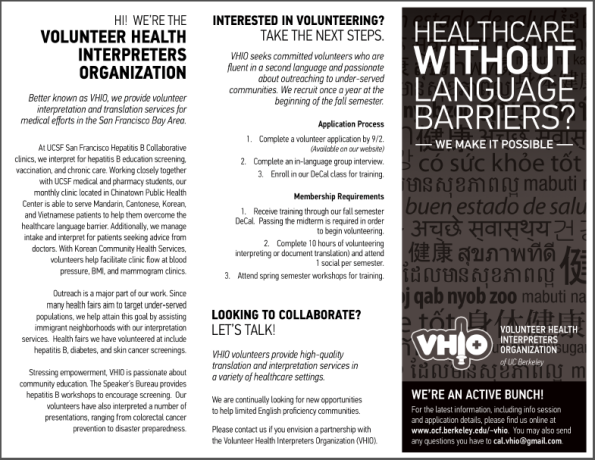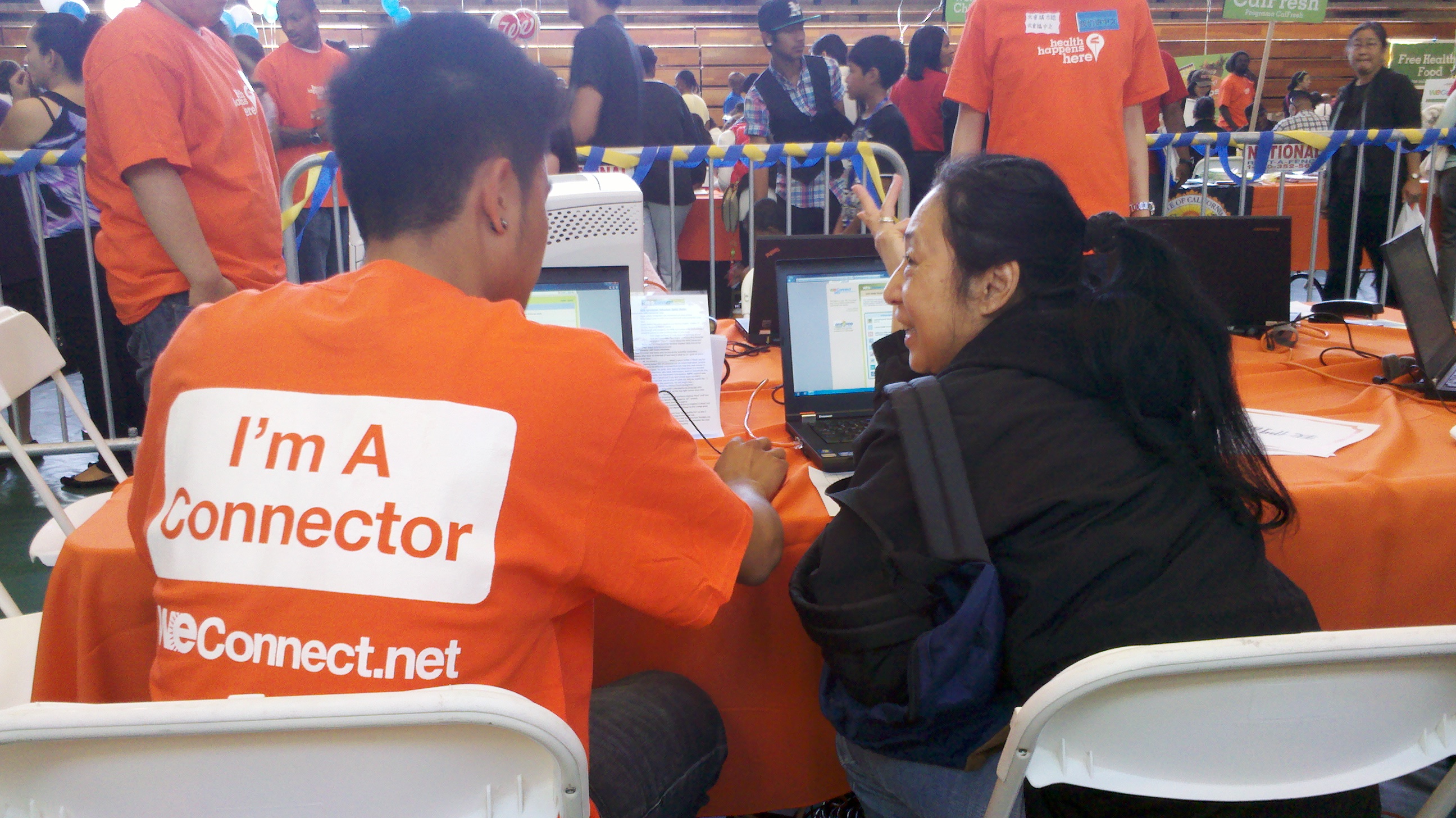About
Mission
The San Francisco County and Alameda County have a high concentration of LEP populations that speak a primary language other than English (44% and 41%) compared with the US average (20%). The San Francisco Bay Area has a long history of language rights advocacy, but there remain gaps in providing language access to LEP populations especially in safety net facilities or community educations and preventions. VHIO was established to fill this gap in interpretation services in the San Francisco Bay Area.
History
VHIO is a University of California, Berkeley undergraduate student-led organization whose roots trace back to 2007, when it was established as the San Francisco Hepatitis B Collaborative (SFHBC) in partnership with University of California, San Francisco health professional students. SFHBC at Berkeley provided trained bilingual students as Asian language interpreters for two monthly UCSF hepatitis B student-run clinics, which we continue to volunteer at.
Dedicated to helping to stop the spread of hepatitis B, SFHBC partnered with organizations such as the San Francisco Hepatitis B Free Campaign and helped at various screening, vaccination, and education events. Four hundred million people worldwide suffer from chronic hepatitis B infection, which tragically can lead to liver cancer early in adult life. It is the 10th leading etiologic cause of death in the world. Fortunately, the spread of the hepatitis B virus is preventable with a simple, safe, and effective vaccine.
Due to an increase in demand for interpretation services, we have been expanding to provide interpretation and volunteering services for a broader range of issues beyond hepatitis B. In August 2010, SFHBC at Berkeley was renamed the Volunteer Health Interpreters Organization (VHIO) to reflect its expanded scope of language capacities and its service base across the San Francisco Bay Area.
Committed to outreach, we are continually establishing new partnerships and volunteering opportunities.
VHIO Language Capacities
Since VHIO began as SFHBC, we originally focused on the API population, which is disproportionately affected by hepatitis B: 10% of U.S. APIs chronically infected with the virus, and APIs constituting 50% of hepatitis B-related deaths in the U.S. VHIO currently provides healthcare interpretation (spoken) and translation (written) in Cantonese, Mandarin, Khmer, Korean, Tagalog, and Vietnamese. As we expand beyond hepatitis B to provide services for all areas of healthcare, we aim to be more comprehensive in serving limited English proficient (LEP) populations across the Bay Area.
Reaching out to help more communities, we plan to establish more language groups in the future depending on demands and needs.
Situated in a community with rich resources of diverse cultures and languages, UC Berkeley, with its large population of bilingual undergraduate students, provides VHIO a solid foundation to serving the LEP communities in the Bay Area. We also welcome any passionate and fluent bilingual speakers from the community to join VHIO.
The Importance of Healthcare Interpretation
Due to convenience, family members and other ad hoc interpreters (friends, untrained medical and nonmedical staff, sometimes children and even strangers) help with interpretation in healthcare settings. Unfortunately, patients frequently report that they do not completely understand diagnoses and treatment when proper interpretation is not available. Errors in translation include omissions, additions, and false fluency; these can result in clinical consequences. There are many medical malpractice cases involving language barriers.
Many LEP patients do not have access to medical interpreters when they need the service. According to one study, no interpreter was used in 46% of the emergency room cases involving LEP individuals. Few clinicians receive training in working with interpreters; only 23% of U.S. teaching hospitals provide any such training, and most of these make it optional.
Good medical interpreters help patients communicate with medical staff. They are familiar with the languages they interpret for, including technical concepts and vocabulary. In addition, they show cultural sensitivity and act as a cultural buffer in facilitating communication.
Services
There are four main components to the language services offered by VHIO: interpreters at clinics, community outreach events, screening events, and online document translations.
Please refer to our Events page for more details and information about our volunteering events.
Document translations that we typically complete include community outreach posters, PowerPoint slides, clinic publicity flyers, surveys, consent forms, and screening result letters.
Training
Training is crucial to ensure high quality of VHIO’s interpreting services. VHIO trains its members through a required DeCal (student-run) class. All new VHIO members are required to take the VHIO DeCal in Health Care Interpreting (fall semester), a 40-hour, 13-week training curriculum adapted from the 60-hour Connecting Worlds Curriculum conducted by Language and Culture Access Program at Asian Health Services, which incorporates the California Standards for Healthcare Interpreters developed by the California Healthcare Interpreting Association (CHIA). Please refer to our DeCal Page for more information.
Booster workshops will be required for returning volunteers in the fall and all new and returning volunteers in the spring to review patient confidentiality, basic guidelines of interpreting, background of conditions and diseases, and commonly used medical terminology and phrases.
Assessment and Research
In our ongoing efforts improve our services, we are collecting data via surveys and statistics to assess the effectiveness of our interpreters. The research project began as Casey Tsai’s (Director 2010-2011) public health honors thesis, and will be continued by the Programs Analyst. The conclusions from data up to May 2011 is as follows:
Trained volunteer student interpreters like VHIO at UC Berkeley can fill important gaps in providing linguistically and culturally competent care in California. By recruiting and training bilingual students who share the same languages and similar cultural background with the LEP populations in the community, VHIO provides a sustainable workforce of free and highly qualified interpreters for grass-roots preventive interventions and outreach events to specific LEP populations in their cultural communities.
Please join us in our campaign to break language barriers!
Brochure
Please click on the images below to open a larger version of our brochure, pictured below.








